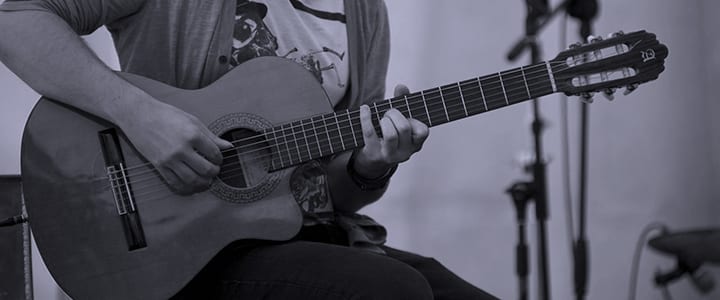Ready to pick up a guitar and start learning to play? Great! Get ready to start your musical journey with this sound advice from guitar teacher Jerry W.…
Learning an instrument takes more than desire alone. Many people excitedly begin learning guitar, but before long the guitar is packed away in the closet and forgotten. What can you do to make sure this doesn’t happen to you? How can you stay motivated as you learn to play guitar? What is the fastest way to learn guitar?
Setting SMART Goals
Most people who don’t reach their goals fail because they did not set “SMART” goals. SMART goals are: Specific, Measurable, Actionable, Realistic, and Time sensitive. The fastest way to learn guitar is to have SMART goals.
Specific – It is not enough to say, “My goal is to play guitar.” You need to focus your goal and set specific smaller goals and action steps. What type of guitar do you want to play? Electric, acoustic or classical? What styles of music do you want to play? Also, consider setting goals for specific skills such as strumming proficiency, number of chords memorized, learning chords in more than one position on the guitar, scales, reading music, reading tablature, learning lead guitar “licks”, learning finger picking patterns, etc. As an example, let’s set a goal for learning chords. To start out we could set a goal to “Be better at chords on the guitar.”
Measurable – Now that you have a goal you need to make that goal measurable. “Be better at chords on the guitar” is hard to measure. There are whole books full of guitar chords. What type of chords do you want to play? Let’s set a more measurable goal. If you are a complete beginner then maybe you could set a goal to “Be better at all major and minor chords in one position.” All guitar chords can be played in multiple positions, but as a beginner learning them in just one position is a good starting point. Now do this for each of your goals. Make sure they are measurable.
Actionable – Make sure your goal is a clear call to action. Use an action verb, not a to-be verb like “am,” “be,” “have,” etc. . In our example of learning guitar chords, our goal, “Be better at all major and minor chords in one position” has no clear call to action. A better goal is “Be able to play all major and minor chords in at least one position.”
Realistic – Ask yourself, does this goal fit in my comfort zone? Set a goal that stretches you to the edge of your comfort zone but not beyond. If you are a complete beginner you may want to simplify your goal to “Be able to play all major chords in at least one position.” When you master this then you can always set a new goal to learn the minor chords, then 7th chords, and so on.
Time Sensitive – A goal without a date is just a dream. Set a date and you will be much more likely to reach it. Putting all of this together our final goal is “Be able to play all major chords in at least one position by March 1st.”
Staying Motivated
Now that you have a goal, how do you stay motivated to accomplish your goal? The fastest way to learn guitar is to stay highly motivated. Let me suggest five things that will keep you motivated:
1. Do what you love! Learn to play the type of music you really love. You will stay much more motivated if you are learning what you really enjoy.
2. Set big goals. Make sure your goal is realistic but still stretches you. Big goals are motivating. Big goals will stretch you to learn faster.
3. Visualize yourself accomplishing your goal. It is very hard to stay motivated on something you don’t really see yourself doing. Spend some time visualizing yourself reaching your goal. You are much more likely to reach your goal if you see yourself doing it.
4. Write them down, review them, and share them with someone. Written goals that you review and share will be much more motivating then some vague goal that is only in your head.
5. Do it with others! Music is more fun with others. As soon as possible spend time making music with others.
Form Good Habits
“Motivation is what gets you started. Habit is what keeps you going.“ Jim Rohn
Most musical goals are reached by developing important habits. Habits are developed by doing them over and over until they become a part of you. What habits do you need to develop? Consider these key habits:
Practice regularly – ideally every day. This will be the greatest single factor to your success.
Practice technique and music – don’t just play your favorite song, also spend time learning specific techniques such as different chord positions, power chords, muting, strumming patterns, finger picking patterns, scales, etc.
Play with others – make it a habit to spend time making music with others.
Don’t join the realm of people with a dusty guitar hidden in some back closet. Set SMART goals, stay motivated and develop effective habits. Soon you will reach your musical goals!
Jerry W. teaches classical guitar, composition, music theory and trumpet in Grosse Pointe, MI. He received his B.M. in Theory and Composition of Music from Cornerstone University, as well as his Master of Music and Ph.D in Music Composition from Michigan State University. Jerry has been teaching students since 1982. Learn more about Jerry W. here!
Photo by monst67
Suzy S.



